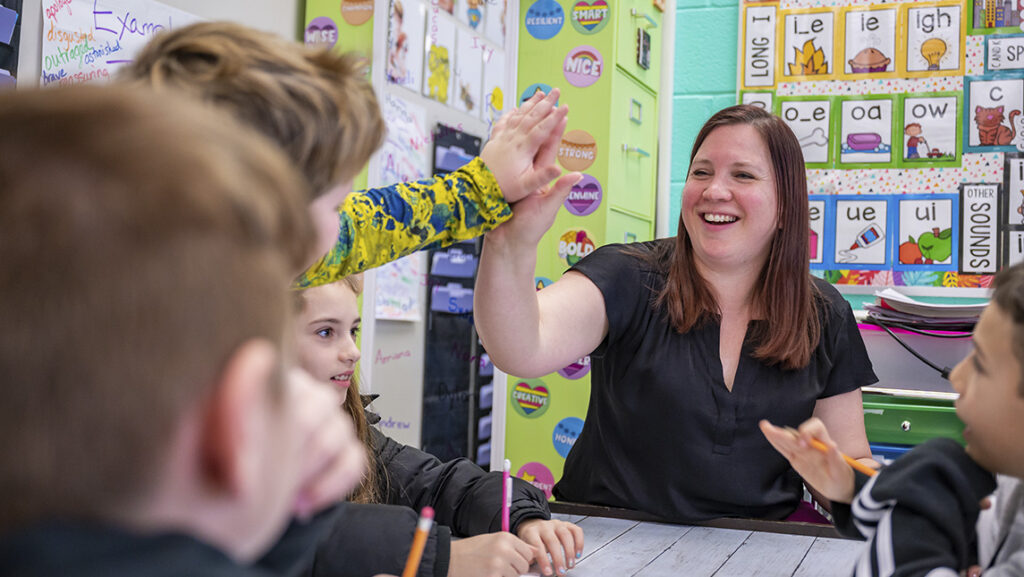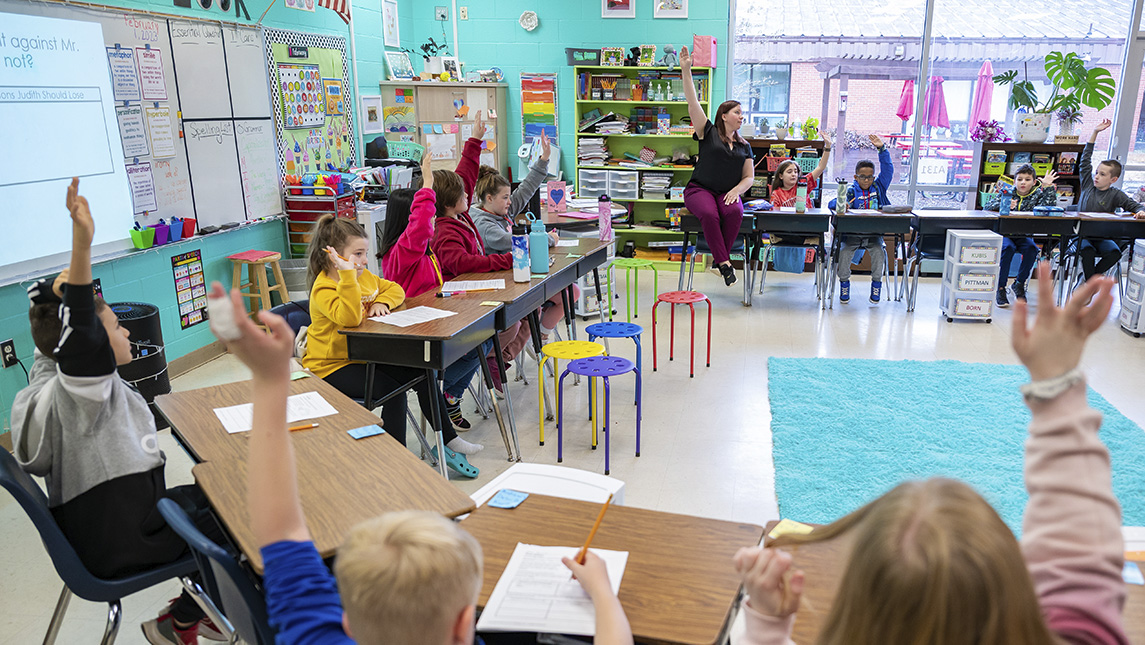How one elementary school teacher is addressing more than Covid-19 academic loss.
The din of adolescent chatter fills Sarah Born’s fourth grade classroom as small groups discuss which laws there should be for a hypothetical new colony on Mars. The nine- and ten-year-olds excitedly debate what should be this new society’s norm and what’s reasonable to expect of its citizens. Their imaginations ignite. This small group discussion is the first step in one of Born’s critical thinking exercises for her students.
Born, a second-year teacher working toward her teaching license at UNCG’s School of Education through the North Carolina Teachers of Excellence for All Children Alternative Licensure Program (NC TEACH), knows a thing or two about critical thinking. She used it daily in her former seven-year career as a litigation lawyer.
“Being a teacher is just as intellectually challenging and is on level with being a lawyer in terms of the skill, passion, and the education needed.” says Born.
From the Courtroom to the Classroom
As an undergraduate, she was on a path for an education degree, but ended up switching to history her junior year and then went on to law school, obtaining her Juris Doctorate from Syracuse University College of Law. Though financially rewarding, she found being a lawyer unfulfilling. She resigned and began teaching a few courses online. Soon, she was volunteering as vice president of the parent-teacher organization (PTO) at her children’s elementary school in Guilford County and knew she wanted to be a full-time teacher in the classroom.
More Than an Academic Gap
What she saw at her school was not just a great need for teachers, but a great need to fill social, cognitive, and educational gaps induced by the Covid-19 pandemic. She’s not wrong.
The results of a state-funded study show N.C. students had lower grades, failed courses and were more absent in the 2020-21 school year compared to prior years. This reflects a lack of engagement in the classroom – something that Born recognized quickly in her first year teaching at Stokesdale Elementary.
“The kids have lost so much more than academics,” says Born. “I see the fifth grade class I taught last year and the fourth grade class I teach now.”
Born explains that her now ten-year-old students had their first grade year interrupted during the nationwide shutdown. Their second grade year was mostly online and socially distanced, which meant they were not learning or playing together regularly with their peers.
“These children lost the ability to socialize, play, and even disagree with their peers for two years because of COVID,” Born explains. “So many important social lessons and development take place at school and on the playground that elementary school students missed.”
Her solution: introduce critical thinking exercises.

Critical Thinking Ignites Engagement
Last year, a colleague introduced her to the book “Thinking Like a Lawyer: A Framework for Teaching Critical Thinking to All Students” by Colin Seale. It immediately struck a chord with her.
“It was a real eye-opener. I read it cover-to-cover and then sat down and created my first lesson to try out in the classroom,” says Born.
The lesson required her fifth grade students to analyze and debate a real case: a six-year-old boy pulled a chair out from behind his aunt who was getting ready to sit down. She fell and broke her hip. The aunt sued her nephew for battery. Born’s exercise for the class was a discussion of whether or not the boy was liable for battery.
“We discussed the elements of battery that had to be met, and went through and applied facts to each one,” explains Born. “Out of 45 students, one student, who didn’t usually participate or engage, raised his hand and said, ‘Well what if he was just trying to pull the chair out for her to help her sit down? But because he is a little kid, he pulled it too far?’ It wowed me. That’s critical thinking.”
From that moment, Born implemented critical thinking exercises regularly in her fifth grade class and continues to do so this year with her fourth graders. It helps her facilitate social development among her students who missed those opportunities during COVID. It also helps them develop confidence and self-efficacy.
“It has been a positive experience for all my kids who are usually too shy to share or know that they don’t know the answer and don’t want to participate. Now they all want to participate,” says Born. “We go over the norms of how we can agree and how we can disagree with each other and do it in a respectful way and still be friends afterwards. They are learning social skills by putting on their lawyer hats. And it’s translating beyond the critical thinking exercises. They are now raising their hands in math, English, and science classes.”
Born’s approach is paying off. In her first year teaching, students in her class scored in the top 25th percentile for the Reading EVAAS Growth Index for the school district and the state.
“The delay of critical thinking skills with this group is apparent, so these activities push them to think and problem solve in ways that they are not used to doing,” Born continues. “My hope is that these activities help to fill in all the gaps these students have as a result of the pandemic.”
On the Path to Licensure, Graduate Degree, and Administration
Born views the teaching license, which she’ll earn this year, as a first step. She chose UNCG’s School of Education for the NC TEACH program specifically because it allows her to complete licensure and apply 18 of her credits toward her Master of Arts in Teaching (MAT).
“I plan to work towards completing my MAT and administration licensure in the next two and a half years,” says Born. “UNCG has a great program and excellent professors. I’m excited about what they have to offer and that I can take the NC TEACH and continue to get the graduate degrees. If there are others out there thinking about making a career change to teaching, just do it.”
In the meantime, she’ll keep engaging her students by meeting them where they are academically and developmentally, and then helping them forge those critical social and cognitive skills that are delayed because of COVID distance learning.
“Every child needs critical thinking skills,” she says. “When you empower children with the ability to think and the confidence to solve problems, that confidence will carry over to reading and math. It’s going to make them interested and believe they can do anything.”
Story by Alice Manning Touchette
Photography by David Lee Row

LEARN MORE ABOUT NC TEACH AT UNCG


